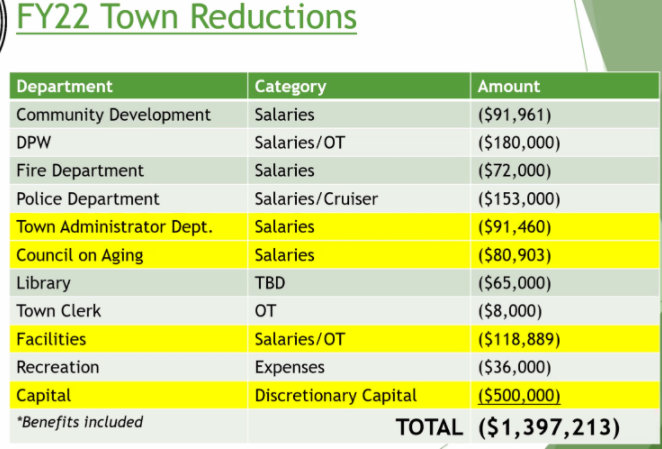Photo:
To the editor:
At a November Parent Teachers Organization meeting, a Belmont Public School administrator explained one of the rationales for the “WIN” (What I Need) blocks in students’ schedules: they provide the time needed to work with students who receive special education services. That prompted a parent to respond that never before had it felt that a minority of students were holding all the others back. The comment, no doubt born of the pandemic’s frustrations and miseries, highlighted a misconception. As the parents of children who receive special education services, we write to explain what really holds back every BPS student and how not passing the budget override on April 6 will only magnify the problem.
Many students have neurological conditions and other issues that necessitate having an Individualized Education Plan (IEP). An IEP specifies services, accommodations, and modifications required for each student and details goals. The document is legally binding, and no educator or administrator can cherry pick services to provide from the IEP or eliminate goals because staffing and funding are just too difficult.
Currently, our very lean school budget means not having critical special education positions for Belmont’s elementary schools. These positions are not “an extra,” as Butler parent and middle school special educator Stephanie Crement wrote in The Belmontonian. In other districts, people in these positions, among other things, complete legally mandated and time-intensive compliance paperwork. Otherwise “those responsibilities fall solely on the teachers and school psychologists,” Crement wrote, meaning less time for Belmont’s dedicated educators to teach all children.
In 2012, a Winn Brook School kindergarten class had fewer than 20 students. At Chenery Middle School, science classrooms have reached or exceeded 30 students in recent years. The Superintendent’s recent budget report to the School Committee details some BHS core academic classes already had as many as 35 students in 2019-2020. This alarming change in class sizes has occurred because from 2010 to 2020, the Belmont Public School total enrollment grew by 21 percent, an additional 823 students. Two Massachusetts Department of Education statistics testify to the effect of the surging enrollment: Belmont falls in the bottom 3 percent in Massachusetts for class size and in the bottom 6 percent in per pupil expenditure. Belmont’s per pupil expenditure falls behind Fall River, Holyoke, and Revere and far behind Concord, Newton, and Weston.
Providing the level of support, accommodations and modifications necessary for students with special education services in a class of 15 to 20 students gets significantly more difficult — and thus requires more individual classroom support — when classes reach 25 to 30 students. A student’s IEP legally binds BPS to provide this individual support. But legal mandate or not, we cannot realistically expect our children, or anyone else’s, to receive the same care and individual attention needed to thrive fully in a 57-minute class with 35 students compared to the attention received in a class of 15 to 20.
Here is what all parents need to know about a critical reason BPS could not provide live, synchronous learning for all students during the WIN blocks: it simply lacked the teachers to do so. Here is what all BPS students — regardless of receiving special education services — face if they return to school in September without an override’s additional funding: 22 fewer teachers and staff than if the override had passed and a $564,760 reduction in programs beginning this summer — arts, athletics and anything else that can be cut. However, with an override’s funding, BPS can hire elementary school special education professionals, teachers for CMS and BHS, and a high school social worker to help all students with mental health challenges. Shell-shocked by the pandemic, many kids will be crying out for a social worker’s help to reintegrate socially and academically.
As parents of children who receive special education services, we support the override because this funding is necessary for the success of our own children. We also know that passing the override is good for ALL of Belmont’s students. To conclude, we quote a recent Belmont Citizen Herald op-ed from BHS students appealing for parents to support the override:
“As of October 2020, the Belmont Public Schools had around 4,700 students. Fewer than four percent of these students are eligible to vote, making our voices almost entirely unheard in an issue in which each student is directly impacted by your vote.”
“The future of Belmont’s students lies in your hands. Please remember us when you vote.”
- Roger Fussa, Chenery Middle School
- Amani Abu Shakara, LABBB
- Charles Bandes and Patsy Collins Bandes, Butler School
- Amy M. Brown, Chenery Middle School
- Amy Frasco, Wellington School
- Helen Josephine, Chenery Middle School
- Dawn Mampreian, Butler School
- Kara Morin, Chenery Middle School
- Abigail Myers, Butler School
